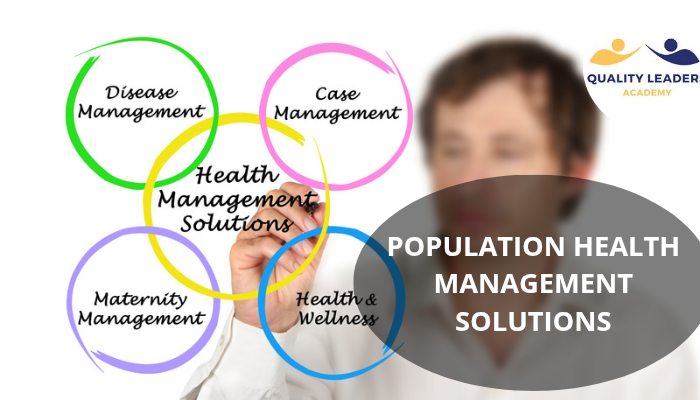Population Health Management (PHM) has become a cornerstone strategy for enhancing patient outcomes, optimizing resource utilization, and transitioning towards value-based care models in today's dynamic healthcare environment. By leveraging data-driven insights and coordinated care approaches, Population Health Management solutions enable healthcare providers to proactively manage the health of defined populations.
UNDERSTANDING POPULATION HEALTH MANAGEMENT
Population Health Management entails the organized analysis and management of health data to enhance the health outcomes of targeted groups. This approach emphasizes preventive care, chronic disease management, and addressing social determinants of health (SDOH) to reduce health disparities and enhance overall community well-being.
CORE COMPONENTS OF POPULATION HEALTH MANAGEMENT SOLUTIONS

Effective Population Health Management solutions comprise several key components:
Data Aggregation and Integration:
Consolidating data from various sources, including Electronic Health Records (EHRs), claims data, and patient-generated information, provides a comprehensive view of patient populations, facilitating informed decision-making.
Risk Stratification:
Analyzing aggregated data to identify high-risk patients enables providers to allocate resources efficiently and prioritize care for those most in need.
Care Coordination:
Facilitating seamless communication among healthcare teams ensures patients receive coordinated and continuous care across different settings, reducing redundancies and enhancing patient experiences.
Patient Engagement:
Incorporating tools such as patient portals and mobile applications empowers individuals to take an active role in managing their health.
Analytics and Reporting:
Utilizing advanced analytics provides actionable insights into population health trends, enabling providers to monitor performance metrics and adjust strategies accordingly.
LEADING PHM SOLUTION PROVIDERS
Various organizations provide comprehensive PHM platforms designed to meet the needs of healthcare providers:
- Arcadia: Known for its comprehensive data aggregation capabilities and predictive analytics, Arcadia's platform supports value-based care initiatives by providing insights into patient populations.
- NextGen Healthcare: Emphasizing care coordination and patient engagement, NextGen's PHM solution offers tools that facilitate communication among care teams and patients.
- Athenahealth: Providing a cloud-based PHM platform that integrates with multiple EHR systems, Athenahealth enables providers to manage diverse patient populations effectively.
- Oracle Health: Focusing on addressing SDOH by integrating non-medical data, such as environmental and socioeconomic factors, Oracle's PHM solutions inform comprehensive care strategies.
IMPLEMENTING PHM: STRATEGIES FOR SUCCESS
To maximize the benefits of PHM solutions, healthcare providers should consider the following strategies:
Invest in Interoperable Systems:
Make sure that PHM platforms are compatible with existing EHRs and other health IT systems to enable smooth data sharing and coordination.
Focus on Preventive Care:
Utilize PHM tools to identify at-risk individuals and implement preventive measures, reducing the incidence of chronic diseases and hospitalizations.
Address Social Determinants of Health:
Incorporate data on SDOH to develop comprehensive care plans that consider factors such as housing, nutrition, and transportation, which significantly impact health outcomes.
Engage Patients Proactively:
Leverage patient engagement tools to encourage self-management and adherence to care plans, fostering better health behaviors and outcomes.
CHALLENGES AND BARRIERS TO IMPLEMENTING POPULATION HEALTH MANAGEMENT
While PHM offers significant benefits, healthcare organizations often encounter several challenges that can hinder successful adoption and execution:
Data Integration and Interoperability:
Integrating data from diverse sources remains a significant hurdle. Disparate systems and inconsistent data formats can lead to fragmented information, complicating efforts to obtain a comprehensive view of patient populations. citeturn0search0
Workforce Limitations:
A shortage of skilled personnel trained in PHM practices can impede implementation. Existing staff may also lack the necessary training to effectively utilize PHM tools. citeturn0search1
Financial Constraints:
The transition to PHM requires substantial investment in technology, training, and process redesign. Limited financial resources can be a barrier, especially for smaller healthcare settings. citeturn0search1
Resistance to Change:
Adopting PHM often necessitates changes in clinical workflows and care delivery models. Resistance from healthcare professionals accustomed to traditional practices can slow down or derail PHM initiatives. citeturn0search11
Addressing Social Determinants of Health:
Effectively managing population health requires addressing SDOH, such as housing, education, and income levels. Incorporating SDOH data into PHM systems and creating interventions to tackle these factors continue to be significant challenges.
Technological Challenges:
Implementing PHM solutions involves deploying advanced technologies, which can be daunting for organizations lacking a robust IT infrastructure. Ensuring data security and patient privacy adds another layer of complexity.
By acknowledging and proactively addressing these challenges, healthcare organizations can enhance the effectiveness of their PHM initiatives, ultimately leading to improved patient outcomes and more efficient care delivery.
THE FUTURE OF POPULATION HEALTH MANAGEMENT
As healthcare continues to evolve, PHM solutions are expected to become increasingly sophisticated, incorporating artificial intelligence and machine learning to enhance predictive analytics. These advancements will enable more precise risk stratification and personalized care interventions.
Moreover, the integration of PHM with telehealth services and remote patient monitoring will expand access to care, particularly for underserved populations. By adopting these innovations, healthcare providers can enhance population health outcomes and increase the efficiency of care delivery.
CPHQ COURSE AND POPULATION HEALTH MANAGEMENT AT QUALITY LEADERS ACADEMY

Quality Leaders Academy offers a comprehensive CPHQ course, focusing on Population Health Management. Participants will gain essential skills in areas such as risk stratification, health data analytics, care coordination, and strategies to improve community health outcomes. This course is ideal for professionals aiming to lead the transition to value-based care and population-focused strategies.
In conclusion, Population Health Management solutions are vital tools for healthcare providers aiming to deliver high-quality, cost-effective care. Organizations can proactively manage patient populations, reduce health disparities, and navigate the shift towards value-based care models by adopting comprehensive PHM strategies and addressing implementation challenges.
Read also:
CPHQ CERTIFICATION REQUIREMENTS
Resources:
https://www.shiftmed.com/insights/knowledge-center/population-healthcare-management-challenges-opportunities-and-solutions/
https://arcadia.io/resources/population-health-management-software



